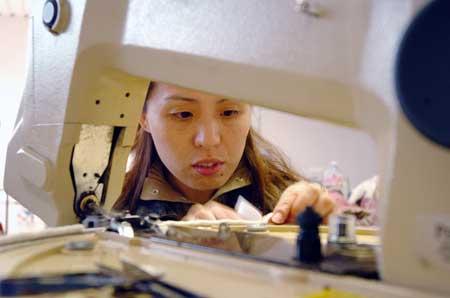
Italian police officers sweep through the mosquito-infested clothes workshop, rifling through personal belongings and cracking jokes about the foreign food as six Chinese laborers look on in fear.
Boxes filled with sparkling black shrugs and red party dresses spill onto the floor of the warehouse - one of 3,400 small Chinese businesses in Prato in central Italy that produce clothes for companies including Zara and H&M.
'Did it correctly'
"I don't understand what the problem is, we did everything correctly," said Giujir, who declined to give her surname because of the police investigation, as she waited by a row of leopard-print dresses for her turn for questioning.
"There isn't much work this year because of the crisis, and we have to pay the rent. I know the police have to carry out lots of controls but it just makes the situation worse," said the worn-out 30-year-old woman.
This is the first raid of the week in the historic town of Prato in Tuscany - a place local authorities see as a sort of new Chinese gangland but immigrants defend as a revitalized hub of Italy's flagging textile industry.
Chinese seen as too many
Chinese immigrants began arriving in Prato some 20 years ago, initially working for Italian companies before setting up their own businesses.
There are now around 17,000 Chinese out of a population of 188,000 - 50,000 if you include the estimated number of undocumented immigrants.
Though Chinese workers are now involved in every stage of production - even the cloth is imported because it costs 10 times less than Italian fabric - the companies can legally sell their clothes with the "Made in Italy" label.
The clothes are sold wholesale - at around five euros ($6.50) for a dress or 10 euros for a coat - and bundled into vans from eastern and northern Europe that come and go seven days a week.
Few Italian shops remain in Prato's Chinatown, located just next to the town's historic center. The area is dotted with Chinese restaurants and supermarkets and almost all the signs are in Chinese.
Mayor urges crackdown
Prato's residents last year voted in a new mayor - himself a textile business owner - who promised to tackle the Chinese community's monopoly of the textile industry and crack down on Chinese-related crime.
Police raids in what Italian media calls "little China" have increased hugely since Roberto Cenni's election, including investigations of mafia groups involved in money-laundering, loan-sharking and human trafficking.
The raid on Giujir's workshop was for a much smaller infraction - workers were liv-ing illegally inside the building in unsafe and unsanitary conditions.
"There are at least six Chinese living here illegally," said Lina Iervasi, head of immigration affairs for Prato's police, pointing to made-up sofa beds, a rice-cooker, a Wii games console and the toys that littered back rooms.
"We have no choice. We'll have to evict the workers, seize the merchandise and lock up the building," she said.
"Their relatives get them over to work, they live closed up in the warehouses and never learn to speak Italian."
